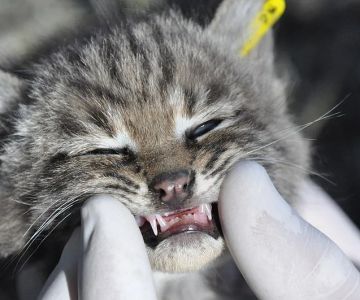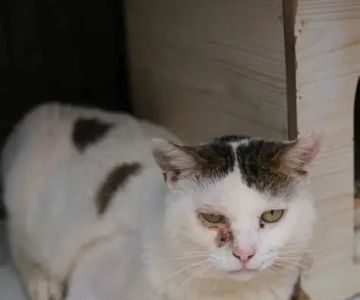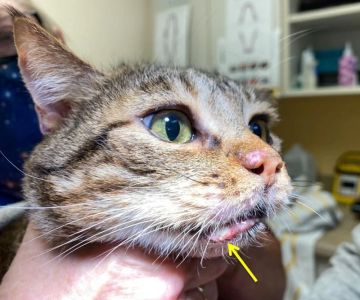Why Is My Cat Hiding? Behavioral and Medical Reasons
- 1- Understanding Cat Behavior
- 2- Behavioral Reasons for Hiding
- 3- Medical Reasons for Hiding
- 4- When to See the Vet
If you've noticed that your cat is hiding more than usual, it can be concerning. Cats, known for their independent and sometimes mysterious behavior, can often choose to retreat to a quiet corner or a hidden spot in the house. While this may seem like normal feline behavior at times, it can also be an indication of something more serious. In this article, we'll explore the common behavioral and medical reasons why your cat may be hiding and what you can do about it.
1- Understanding Cat Behavior
Cats are naturally solitary animals. Their instincts drive them to seek out quiet and secluded places when they need rest or want to avoid potential threats. However, as a pet parent, it’s important to understand the context behind their behavior. Hiding can be a normal part of a cat's routine, but when it becomes excessive, it could indicate an underlying issue.
Cats communicate largely through body language. When they hide, they might be telling you that something is wrong, whether it’s emotional or physical. Understanding the subtle signs of stress, fear, or illness in cats is key to keeping them happy and healthy.
2- Behavioral Reasons for Hiding
There are several behavioral reasons why a cat may choose to hide. Some of these are entirely normal, while others may require attention. Here are some of the most common behavioral causes:
Stress or Anxiety:
Just like people, cats can experience stress and anxiety. A change in their environment, such as moving to a new home, the introduction of new pets or people, or even loud noises like thunderstorms, can cause a cat to seek solace in hidden spaces. Stressful experiences may cause a cat to hide as a coping mechanism.
Fear of Other Animals:
If there are other animals in the household, particularly if they are aggressive or overly dominant, your cat may hide to avoid conflict. Cats are territorial creatures, and any threat to their territory may lead them to retreat into a safe, hidden place.
New Environment:
When a cat is introduced to a new environment or has to adjust to changes in the home (like new furniture or rooms), they might hide for a few days until they feel more comfortable. It’s a natural response to feeling uncertain or overwhelmed by unfamiliar surroundings.
3- Medical Reasons for Hiding
Hiding can also be a symptom of an underlying medical issue. Cats, by nature, tend to hide signs of illness because they are instinctively trying to avoid appearing vulnerable to predators. If your cat is hiding excessively, it could be a sign that they are not feeling well. Below are some medical conditions that might cause a cat to hide:
Pain or Injury:
If your cat is suffering from an injury, they may seek out a secluded spot to rest and recover. If your cat is limping, reluctant to move, or showing signs of discomfort, they may be trying to hide from you because of the pain.
Illness or Infection:
Cats are known for hiding when they are sick. Conditions like kidney disease, gastrointestinal issues, or respiratory infections can make a cat feel miserable, prompting them to find a quiet, dark place where they can rest. If you notice any signs of illness, such as changes in appetite, lethargy, or vomiting, it's crucial to consult with a veterinarian.
Senior Cats and Cognitive Dysfunction:
Older cats may develop cognitive dysfunction syndrome (CDS), which is similar to dementia in humans. This condition can cause confusion, disorientation, and a tendency to hide. If your senior cat is becoming more withdrawn, it might be a sign of cognitive decline.
4- When to See the Vet
If your cat’s hiding behavior persists for more than a day or two, or if you notice any signs of illness such as weight loss, changes in eating habits, or abnormal behavior, it's time to seek veterinary advice. A veterinarian can conduct a thorough examination to rule out any medical conditions and provide the necessary treatment to help your cat feel better.
It’s also important to keep an eye on other symptoms like excessive grooming, changes in litter box habits, or aggression. These could indicate that your cat is not feeling well or that something is wrong in their environment.
At Omnia Pet, we understand how much your furry friend means to you. If you are unsure whether your cat’s hiding behavior is a sign of illness or stress, consulting with a professional is always the best course of action. A prompt diagnosis can lead to better treatment outcomes, ensuring your cat gets back to their normal, playful self.









 Joey's Pet Outfitters4.0 (254 reviews)
Joey's Pet Outfitters4.0 (254 reviews) URvet Care Midtown Medical Center4.0 (65 reviews)
URvet Care Midtown Medical Center4.0 (65 reviews) Halo Veterinary Hospital5.0 (156 reviews)
Halo Veterinary Hospital5.0 (156 reviews) Vetco Vaccination Clinic3.0 (3 reviews)
Vetco Vaccination Clinic3.0 (3 reviews) Pet Power Studio5.0 (30 reviews)
Pet Power Studio5.0 (30 reviews) Eastside Animal Hospital4.0 (227 reviews)
Eastside Animal Hospital4.0 (227 reviews) The Best Calming Pheromone Diffusers for Anxious Cats
The Best Calming Pheromone Diffusers for Anxious Cats How to Stop Your Cat from Getting on the Kitchen Counter
How to Stop Your Cat from Getting on the Kitchen Counter How to Create a Pet Memory Book After They Pass Away
How to Create a Pet Memory Book After They Pass Away Why Do Kittens Have Whiskers on Their Legs? | Omnia Pet
Why Do Kittens Have Whiskers on Their Legs? | Omnia Pet The Best Diet for a Russian Blue Kitten's Shiny Coat
The Best Diet for a Russian Blue Kitten's Shiny Coat How to Tell if Your Kitten is a Maine Coon Mix – Signs and Characteristics to Look For
How to Tell if Your Kitten is a Maine Coon Mix – Signs and Characteristics to Look For